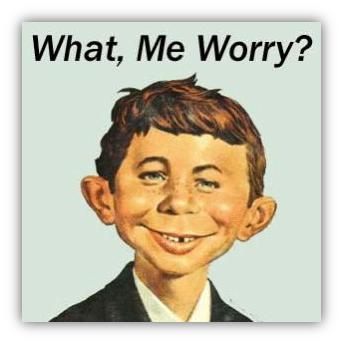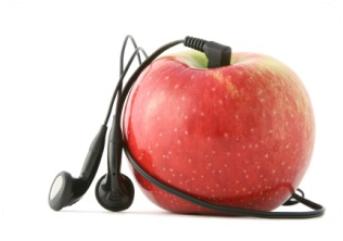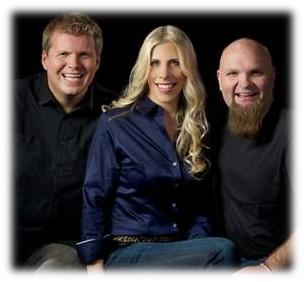 The long-awaited announcement that Apple is now officially playing radio – called iTunes Radio (italics mine) – simply reinforces what has long been happening in the pure-play space:
The long-awaited announcement that Apple is now officially playing radio – called iTunes Radio (italics mine) – simply reinforces what has long been happening in the pure-play space:
Everyone’s trying to recast, redefine, and reinvent radio – except most radio broadcasters.
Pandora’s response to Apple’s new baby sounded a lot like Mad’s goofy poster boy, Alfred E. Newman and his famous quote: “What, me worry?”
As Pandora noted, “…we have spent the last 13 years singularly focused on redefining radio and benefit from unrivaled intellectual property, deep experience in delivering personalized playlists, and ubiquitous product availability across every platform.”
So who’s the target of iTunes Radio – Pandora, radio broadcasters, or someone else?
Michael Robertson – the guy behind MP3.com, MP3Tunes, and Dar.fm – is quoted in RAIN with his view that iTunes Radio represents a “frontal attack on FM radio and will accelerate the deterioration in their business… FM cannot compete with the benefits of Internet delivered music.”
Others in this digital music space may be quick to agree with him. But as pure-play competition proliferates – Pandora, Spotify, Songza, the new Google offering, and now Cupertino’s new digital radio service that even includes Siri integration – where does this really leave broadcast radio?
In the same place it’s been over the last few years – grappling with its core music mission.
A new offering from Apple isn’t going to alter radio’s situation one iota. And that challenge is to rededicate itself to doing what it does best in an environment that is ever-changing, highly personal, uber customizable. and rapidly becoming omnipresent in consumers’ lives.
Radio needs to look beyond staring at market by market ratings and Miller Kaplan reports, and begin to see the world in the same way that Jeff Bezos, Mark Zuckerberg, and Tim Westergren see it. In essence, how can radio continue to compete for the minds and hearts of consumers as music becomes ubiquitous and commoditized? What is it that broadcast radio can do that these other media cannot?
beyond staring at market by market ratings and Miller Kaplan reports, and begin to see the world in the same way that Jeff Bezos, Mark Zuckerberg, and Tim Westergren see it. In essence, how can radio continue to compete for the minds and hearts of consumers as music becomes ubiquitous and commoditized? What is it that broadcast radio can do that these other media cannot?
Bob Pittman reminded the media world in The Wall Street Journal that products like Pandora and iTunes Radio aren’t really threats to broadcast radio because custom channels aren’t viable businesses. He went on to say that FM radio’s mission is to help consumers “join the world.”
He’s right, of course. Broadcast radio connects people with communities and offers “a very private experience” – when it’s on its game.
So now that the Apple plan has been announced, Pandora is geared up for a street fight, Spotify will aggressively keep chasing music lovers, and Google will try to get its music service off the ground.
So where’s broadcast radio?
Hopefully, serving listeners, advertisers, and communities.
The pure-plays talk about custom channels as if they’re personal. While they may reflect your unique musical footprint, there’s nothing really personal about most of them. Radio, on the other hand, can be an intensely personal experience, especially in the car where personalities and DJs can have one-to-one contact with drivers in ways that elude CDs, jukeboxes, and digital playlist services.
Radio will have to decide about the role of the personality in the changing local marketplace. It is radio’s key advantage, providing the opportunity to personally meet and greet consumers and touch their lives. In most markets around the country, radio still very much resonates with people.
Here in Detroit, it’s been interesting to watch what’s been happening with the Greater Media cluster, for example.
There have been some big roster moves in the past 30 days that have shocked the market. The exit of Drew & Mike from WRIF, the entrance of Dave & Chuck the Freak (pictured, with Lisa Way) to replace them, and the pairing of Trudi Daniels (from the Drew & Mike Show) with Ken Calvert on WCSX all say the same thing about local radio: personalities matter and people care about them.
The coverage of all these moves by other local media outlets has been unprecedented, signaling that consumers are more interested in local DJs than they are the number of song skips offered by Pandora. The Dave & Chuck the Freak story has been one of the big trenders in Crain’s Detroit from the moment it was announced they were leaving their former station. The team is heavily connected socially with its active, excited audience.
Local radio matters. Touching people’s lives and acknowledging them is at the heart of it.
So maybe Amazon will be next with its pure-play service. Or perhaps Microsoft. Or maybe Sony.
But all of these new channels might just end up long-tailing themselves into irrelevance. The true currency of real radio is live and local.
Wouldn’t that be the message to deliver and reinforce to Wall Street and radio’s audiences that truly spells out the defining difference?
Radio should no longer assume that everyone knows what it does well.
Time to start walking the walk. And yes, talking the talk.
- What To Do If Your Radio Station Goes Through A Midlife Crisis - April 25, 2025
- A 2020 Lesson?It Could All Be Gone In A Flash - April 24, 2025
- How AI Can Give Radio Personalities More…PERSONALITY - April 23, 2025




Here’s the billion dollar question.
How soon before Pure Plays start availing themselves of the countless radio programming talent that has been jettisoned from Terrestrial Radio over the past 10 years?
Programmers, producers, jocks – creative and talented folks could put their radio making skills to use on internet based radio services.
Can’t happen?
Won’t happen?
I can already imagine a dozen ways to implement this. For crying out loud the Biggest Morning Show on Terrestrial Radio is programmatically assembled from pre-recorded pieces. There’s very little happening on Terrestrial Radio that can’t be done on internet based Radio.
The tech isn’t really difficult for the types of people running Pure Plays. What they’re missing is know how. And there’s plenty of people that know-how on the beach.
Fred, forget the talking points about why these “services” aren’t really a threat to “Radio” – that misses the point.
Instead you should see them for what they really are – your future clients. The Future of “Radio”. The new wild west. The new FM.
Terrestrial Radio will continue to dominate “Radio” in the same way the Big 3 TV Networks continue to dominate TV.
Radio is much simpler to create than TV. There’s a lot of Radio Talent available. And the tech offers opportunities transmitters can’t.
The 500 channel universe didn’t kill TV – it made it better. Internet Radio has the opportunity to be better than transmitter radio.
Pure Plays that evolve to give users the best parts of Radio fused with the interactive technology of the internet can indeed create meaningful products for audiences underserved by Terrestrial Radio. There’s no better people to design these products than us.
This doesn’t threaten “Radio” – it strengthens it.
The future for “Radio” is huge. We just have to be imaginative and not let our love of transmitters cloud our judgement.
Jeff, I think you’ve nailed some key points here (my client list aside). It is often difficult to look past radio’s legacy technology, but as you indicate, cable, TiVo, and other technologies forced television to do so. While it’s a different world for local TV, they have ample opportunity to do very special things that can enchant their markets.
There are many moving parts here, from Google and Apple creating streaming radio to Pandora buying a broadcast radio station. Worlds are colliding and consumers will end up with many more choices. And hopefully, professionals who have remained nimble, curious, and adventuresome will find their place in this new world.
Thanks so much for adding to the conversation.
good stuff. thanks guys. i’m going to go practice my nimble, curious & adventuresome.
benson
Dave, you have nothing to worry about in the nimble department. Thanks for the kind words.
I think you’re comparing apples to oranges. You know who uses terrestrial radio? People in cars who commute twice a day. People who own stores who play it as background. People use radio to meet specific needs. And those needs aren’t really changing. Radio is free and people are happy with how it functions.
Music discovery has changed. People aren’t using terrestrial radio to learn about new music anymore. They are getting recommendations from their friends, hearing it on TV shows, or using the Internet. There is definitely a market for services like Pandora, iTunes Radio, Google, Slacker, Tune-In, etc..
But, I wouldn’t put too much faith in anything Michael Robertson is working on. He has piloted a string of failures since MP3.com and he’s barking up the wrong tree with DAR.fm. People might want to listen to a talk radio show they missed (or listen to a good interview over again). But, I don’t think that they’ll crack open their wallet and pay for it. Most talk radio stations offer clips on their web site. Others, like PBS, offer full interviews.
For the 60-120 minutes a day that I’m in the car commuting to and from work radio is great. But, as soon as I arrive the radio goes off and I go on with my day. It’s perfect for a free way to kill some time. But, I’m certainly not going to pay for Satellite Radio or some Premium service when I can get it for free.
Malcolm, appreciate the POV & the perspective. Our Techsurvey9 data suggests that more people than you think still consider broadcast radio a discovery source. But there’s no question that many of the “givens” that radio has counted on for decades are very much up for grabs. Are pure-plays and broadcast radio apples and oranges? Or is it all blending together as each side co-opts the other’s qualities. Thanks again.